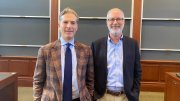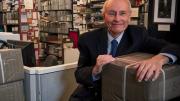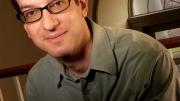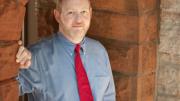Monday marked a year since Hamas’s attack on southern Israel, which ignited a war in the Middle East and a wave of pro-Palestine protests on American college campuses. Several campus events marked the anniversary, including a pair of discussions at the Harvard Kennedy School and a vigil organized by Harvard Hillel and Chabad. On Tuesday, two professors gathered to discuss how the last year has changed the relationship between American Jews and Israel. Convened by the Center for Jewish Studies and the Julis-Rabinowitz Program on Jewish and Israeli Law at Harvard Law School, Frost professor of Jewish history Derek Penslar and Felix Frankfurter professor of law Noah Feldman examined the past, present, and future of American Jewry. Penslar lectured on the “betrayal” American Jews experienced this year, and Feldman examined why American Jews viewed this year’s pro-Palestine protests as alarming and antisemitic.
Penslar, who cochairs Harvard’s antisemitism task force, began the afternoon by acknowledging that he did not speak on behalf of all Jews, but was aiming to represent the opinion of mainstream American Jews, as embodied by synagogues and legacy community organizations (such as the American Jewish Committee and Anti-Defamation League). He outlined the “dual contradiction” that mainstream American Jews faced throughout the past year. “On the one hand, they’re feeling more vulnerable than any time since the Second World War,” he said, referring to the Hamas massacre of last October, the year of pro-Palestine protests, and the spike in antisemitic incidents. At the same time, the Jewish community “is displaying ongoing signs of strength in its engagement with the American polity.”
Penslar boiled down those contradicting emotions to a single word: betrayal. “Betrayal is a strange emotion,” he said. “Betrayal assumes the breach of trust,” continuing, “You cannot be betrayed by a stranger. You can only be betrayed by someone you know.” Jewish resistance to antisemitic and anti-Israel sentiments, he said, imply a baseline faith in the American system and its government. “You don’t lodge a lawsuit against a university,” he said, obliquely referencing the pending suit against Harvard by Shabbos Kestenbaum, M.T.S. ’24, “unless there is a sense that there is a justice system, that there is a case to be made, that the case will be heard, that justice will be done.”
To explain how Jews developed trust in the government, Penslar turned to history. Before Jews started acquiring full citizenship rights throughout the Western world in the late eighteenth century, they had two ways to respond to antisemitism, Penslar said. They could “passively accept it,” viewing it as “unstoppable.” Or they could employ intercessors, who he described as “wealthy individuals who intercede quietly with state authorities to try to lessen the impact of an antisemitic legislative decree or a riot.”
But once Jews became citizens, a new toolbox became available. In the mid-1800s, he said, Jews in France, the United States, and the United Kingdom “would call upon the great powers publicly to intervene on behalf of persecuted Jews in North Africa or in the Russian Empire.” American Jews, he argued, particularly placed their faith in the court of public opinion and in the actual courts, confident that they were “in every way equal to Christians” and could invoke the law to protect themselves.
Through those public declarations, American Jews began to argue that antisemitism was inherently un-American. “In the twentieth century, Jews came to view themselves to be not unusual or exceptional citizens,” Penslar said, “but rather exemplary citizens of the Republic. And by that argument, antisemitism is not just bad for the Jews: it was bad for everyone….It violated the social contract of the United States.”
Penslar described twentieth-century American Jewry as markedly optimistic. For American Jews, he said, Zionism was not about moving to Israel; they were confident in their faith’s future in America. Between 1967 and 1973—an era of extreme confidence in the Jewish state—only one percent of American Jews moved to Israel, Penslar noted. “Zionism in America,” he said, “has always assumed a faith in America as well as a pride in Israel.”
Such was the sting of “betrayal” this year, particularly for left-wing American Jews, who watched people they once considered political allies rationalize and justify Hamas’s massacre. Many Jewish Harvard alums felt betrayed, too. Penslar said that “Jews had a rough time getting admitted, being socially accepted” at Harvard until the 1960s. But the ’60s until the 2010s represented “a golden age for Jews at Harvard and other universities.” This year, many Jewish alumni have come to believe “the university they went to no longer exists,” he said. New admissions practices in the past two decades have yielded more diverse classes. And the new discourse of intersectionality has drawn ties between ongoing racism in the United States and the plight of the Palestinians. Even as Jews have struggled with this year’s political reality, Penslar emphasized the foundation of confidence that undergirds their reaction.
After Penslar finished speaking, Noah Feldman (who cochaired Harvard's institutional voice working group) followed, seeking to understand why American Jews have perceived anti-Israel protests on campuses as dire and antisemitic. He, too, turned to history. For about 2,000 years, there were Jews but no Jewish state, he said. For Americans living through the early years of Israel, he said, “being Zionist was considered to be one of the ways you could think of yourself as a Jew.” But in the following decades, American Jews increasingly placed Israel at the center of their Jewish identities. Now, “for the great majority of American Jews, to hear the view expressed that Israel’s very existence is morally problematic or maybe wrongful is experienced as antisemitic—sincerely experienced as antisemitic.”
Feldman too looked toward mainstream Jewish organizations, noting their shock at the campus response to the October 7 attack. Those groups likely expected “a broad post-9/11-style condemnation of the terrorist attack,” he said. “But instead, what emerged was something almost 180 degrees the opposite. Namely, the regularization—I don’t even say normalization—of a point of view that says that Israel is not merely an apartheid state, or not merely a settler-colonial state, but a state that is actively engaged in genocide, a state that…does not have a core moral right to exist.”
Feldman pointed to Ta-Nehisi Coates’s new book, The Message, as evidence that such fundamentally anti-Israel rhetoric is finding a home on college campuses. It is significant, Feldman argued, that one of America’s most notable public intellectuals on race chose Israel/Palestine as his “latest intervention.” But more significant is that Coates’s argument could become mainstream on campuses. “As he puts it,” said Feldman, paraphrasing from the book, “the experience of having been subjected to genocide is not a moral ground for the creation of the state if that state involves the conditions that Israel entails. In other words, the core of the argument is that Israel’s existence at a basic, structural level is illegitimate.”
Though such rhetoric may exist primarily on college campuses and in high intellectual spaces, Feldman emphasized that it still has broader importance. American Jewish organizations, he said, have realized that “political opinion in the United States on questions like Israel is heavily shaped by elite political judgments, that universities are one of the places where elite political judgment is formed, that they are where it’s formed intergenerationally.” Furthermore, rhetoric on college campuses this year can have a concrete impact through the election. Feldman fears that support of Israel will no longer be a bipartisan cause.
It may be surprising to hear one of the most discussed political issues described as bipartisan. But Feldman traced the U.S.’s bipartisan support for the Israeli state close to its founding. He noted that although American Jews primarily vote for Democrats, Republican presidents have generally been equally supportive of Israel. Both parties risk fracturing this bipartisanship, he said. Former President Donald Trump, Feldman noted, wants to turn Israel into a partisan issue to woo Jewish voters—he wants Jews to believe that only he will support the state. Democrats, Feldman projected, may reassess their future support of Israel if they believe pro-Palestine voters in Michigan cost Vice President Kamala Harris the election.
A partisan future for the Israeli-American relationship would be bad for Israel and its supporters, said Feldman. “Imagine what it’s like geopolitically if support for your wars you’re fighting, which you perceive as existential wars, is in fact a partisan issue,” he said. “Then you’re Ukraine. Ukraine’s genuinely existential…war with Russia depends…to an overwhelming degree on who wins the U.S. election.”
Though he described problems in the Middle East and at universities, Feldman is hesitant to project how this war and its impact on campus will resolve. “We are in medias res,” he said.
Tuesday’s discussion was notably civil. Students packed the classroom, asked challenging questions, and listened to the speakers. While Penslar and Feldman were speaking, The Crimson reported that this morning, a pro-Palestine protester splattered the John Harvard statue with red paint and smashed University Hall windows. Harvard Out of Occupied Palestine, the pro-Palestine student group that spearheaded the spring encampment, told The Crimson they were not involved in the vandalism. It is not yet clear whether the vandal was a student. (A video of the act was posted by an unaffiliated Instagram account, “Unity of Fields.”)
As the war in the Middle East continues—and intensifies—it will be of note how the campus responds. Will it be with education and discussion, like Tuesday’s panel, or with acts of force?









